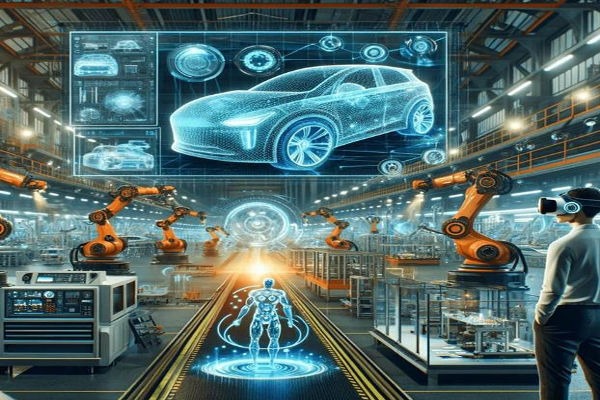The concept of the metaverse, once confined to the realms of gaming and entertainment, has swiftly transitioned into the industrial domain, heralding a new era of digital transformation known as the “Industrial Metaverse.” This digital ecosystem integrates physical and virtual worlds, enabling industries to innovate, optimize, and collaborate in ways previously unimaginable. As industries grapple with the challenges of Industry 4.0, the Industrial Metaverse emerges as a pivotal force, offering unprecedented opportunities for enhanced productivity, efficiency, and collaboration in the virtual workspaces.
Defining the Industrial Metaverse: At its core, the Industrial Metaverse is an extension of the broader metaverse concept, tailored specifically for industrial applications. It encompasses a virtual environment where real-world industrial processes are replicated, simulated, and optimized. This virtual space leverages advanced technologies such as artificial intelligence (AI), digital twins, the Internet of Things (IoT), augmented reality (AR), and virtual reality (VR) to create an immersive and interactive digital environment. Within this metaverse, industries can visualize and interact with digital replicas of physical assets, systems, and processes, enabling real-time decision-making and collaboration across the globe.
The Role of Digital Twins
A cornerstone of the Industrial Metaverse is the concept of digital twins. Digital twins are virtual replicas of physical assets, processes, or systems that are updated in real-time to reflect changes in their real-world counterparts. These digital twins enable industries to simulate scenarios, predict outcomes, and optimize operations without disrupting actual production. For example, a manufacturing plant can create a digital twin of its production line to identify bottlenecks, test new configurations, and optimize workflows, all within the virtual environment before implementing changes in the physical world. This not only reduces downtime but also minimizes costs and risks associated with trial-and-error approaches.
Enhanced Collaboration and Training
One of the most transformative aspects of the Industrial Metaverse is its ability to foster collaboration across geographies. Engineers, designers, and operators from different parts of the world can collaborate in real-time within the virtual environment, working on the same digital twin or simulation. This level of collaboration eliminates the need for physical presence, reducing travel costs and accelerating project timelines.
Moreover, the Industrial Metaverse is revolutionizing training and skill development. AR and VR technologies enable immersive training experiences where employees can practice complex tasks in a safe and controlled virtual environment. This is particularly valuable in industries with high-risk environments, such as oil and gas, where hands-on training can be costly and dangerous. By training in the metaverse, employees can build confidence and competence before engaging with real-world equipment.
Driving Sustainability and Efficiency
The Industrial Metaverse also plays a crucial role in advancing sustainability efforts. By simulating and optimizing processes in a virtual environment, industries can reduce energy consumption, minimize waste, and lower their carbon footprint. For instance, a logistics company can use the metaverse to model and optimize supply chain routes, reducing fuel consumption and emissions. Similarly, manufacturers can simulate different production methods to identify the most energy-efficient and environmentally friendly approach.
Challenges and Future Prospects
While the Industrial Metaverse holds immense promise, it is not without challenges. Data security, interoperability between different platforms, and the need for robust infrastructure are key considerations. Additionally, industries must address the digital divide, ensuring that all stakeholders have access to the necessary tools and training to fully participate in this new ecosystem.
Looking ahead, the Industrial Metaverse is poised to become a fundamental component of Industry 4.0. As technology continues to evolve, the metaverse will likely expand its capabilities, offering even more sophisticated simulations, real-time analytics, and collaborative tools. Industries that embrace this digital revolution will be better positioned to innovate, compete, and thrive in the dynamic global marketplace.













